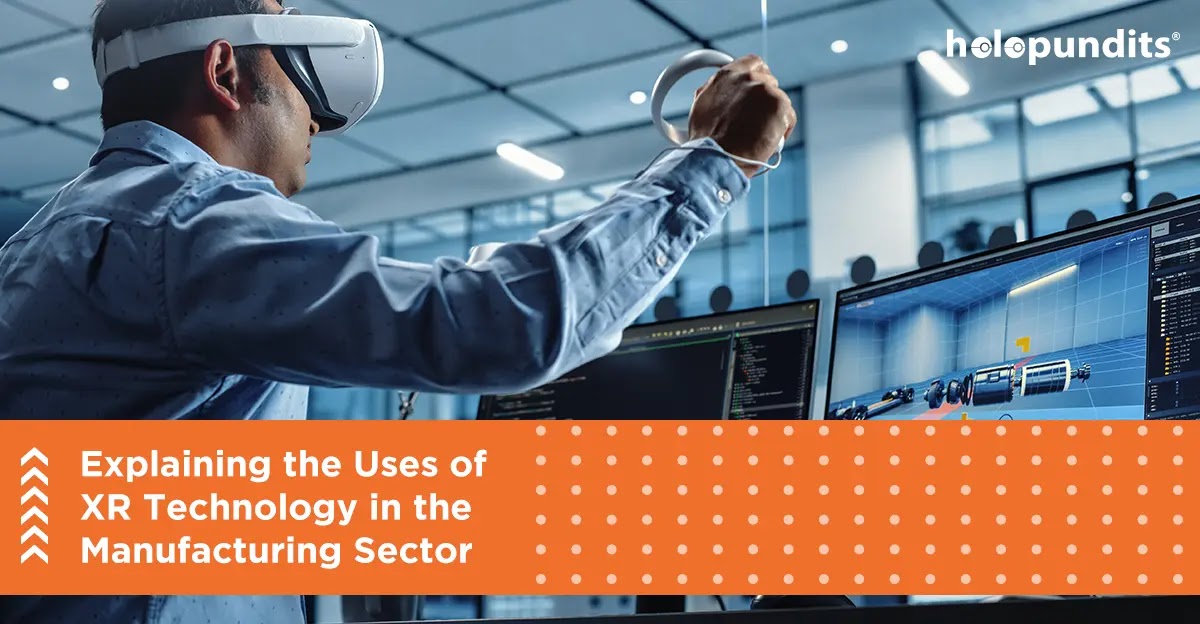Companies in the manufacturing and industrial space are constantly searching for techniques to make their processes more efficient, productive, and cost-effective. As technology advances at a rapid rate, many organizations are beginning to realize that using immersive technology in their business can solve a series of problems, like slow/expensive product development, complex training requirements, etc. A few years ago, extended reality technology was perceived as a mere tool to enhance the entertainment industry. However, XR is quickly gaining prominence in many industries, including the manufacturing sector.
By adopting XR technology, companies can maximize productivity and minimize safety risks in the workplace. In this blog post, we will explore some use cases of XR in manufacturing and how it can benefit your business.
In this blog,
Use Cases of Extended Reality in the Manufacturing Sector
1. Immersive Training and Guidance
Employees in the manufacturing industry work with several complex pieces of machinery daily. Learning how to utilize these tools safely and efficiently is crucial to improving productivity, and companies need to invest in extensive employee training programs to achieve this goal. Unfortunately, training employees in manufacturing processes can often be time-consuming and expensive. Taking equipment out from operation for training leads to downtime, which can affect production and be very expensive. However, adopting XR technology in business can present a way to train workers without any disruptions. Organizations can use XR for employee training, providing an enhanced training experience in a safe virtual environment. XR helps workers master new skills faster without putting them in risky scenarios; statistics show that XR helps manufacturers reduce training time
by 75%. With XR simulations, trainees can repeat training activities multiple times to gain proficiency, leading to improved efficiency and fewer accidents in the workplace.

2. Remote Customer Support
Offering customer support that requires technician visits and repairing equipment can be tedious, thus negatively impacting the customer experience. Extended reality can help improve the customer support process by enabling field service technicians to provide remote assistance. With the help of XR equipment like smart glasses, technicians can view real-time information and accurately resolve issues working from remote locations.
3. Better Collaboration
Engineers and manufacturing specialists may need to connect with other engineers to develop and market a product. Unfortunately, the pandemic has made it difficult to travel and hold face-to-face conversations with large groups of people. One of the biggest advantages of incorporating XR into business is that it has the potential to bring people together. For example, people can come together in a virtual reality environment to test a product and share instant feedback.
4. Product Development
The competitive market and the increasing customer demand are putting pressure on manufacturing companies. The need for product development in a short time and at low costs requires companies to consider investing in emerging extended reality (AR, VR, MR) technologies. XR in business can accelerate all the steps involved in product development, from conceptualization to testing and deployment.
5. Workplace Safety
Employees in the manufacturing sector are at risk of injuries and mishaps because of the nature of the work environment. Organizations should take workplace safety seriously and take necessary measures to mitigate the risk of accidents. With XR technology, companies can overlay information about the work environment to improve safety awareness in the workplace. Further, corporations can post real-time safety alerts through XR applications and train their employees better to react to risky scenarios.
6. Equipment Maintenance
When complex equipment requires maintenance, organizations are compelled to slow down and bring their operations to a halt to bring in specialists to repair the equipment. It leads to equipment breakdown and downtime, causing concerns as it affects production. Extended reality allows on-site workers to connect with experts wherever they are for faster machinery diagnosis and repairs. XR can help manufacturers eliminate travel costs for visiting experts, improve collaboration, and increase efficiency. A
study shows that XR improves expert work efficiency by 30% and prevents 75% of major trips, saving money.
7. Immersive Product Marketing
Traditional sales methods involve setting up physical booths at exhibitions, requiring potential buyers to travel to particular locations for product demos. Incorporating XR technology eliminates the need to travel for product demonstrations. Using XR can be an effective marketing approach, as companies can offer immersive 3D demonstrations in a virtual reality environment, helping customers make quick decisions.
The Future of XR in Manufacturing
Manufacturers are quickly discovering the potential of extended reality outside the entertainment industry. XR in manufacturing has the potential to enhance everything from conceptualization to productivity in the industrial space while still ensuring workplace safety and better collaboration. The use cases discussed above are just the tip of the iceberg. The possibilities are endless with XR, and we are excited to see what the future holds.
Do you want to adopt XR in your business? At HoloPundits, we are experts in developing immersive technologies for companies in manufacturing, healthcare, education, and more. We promise to bring your ideas to life with efficient and cost-effective solutions.






